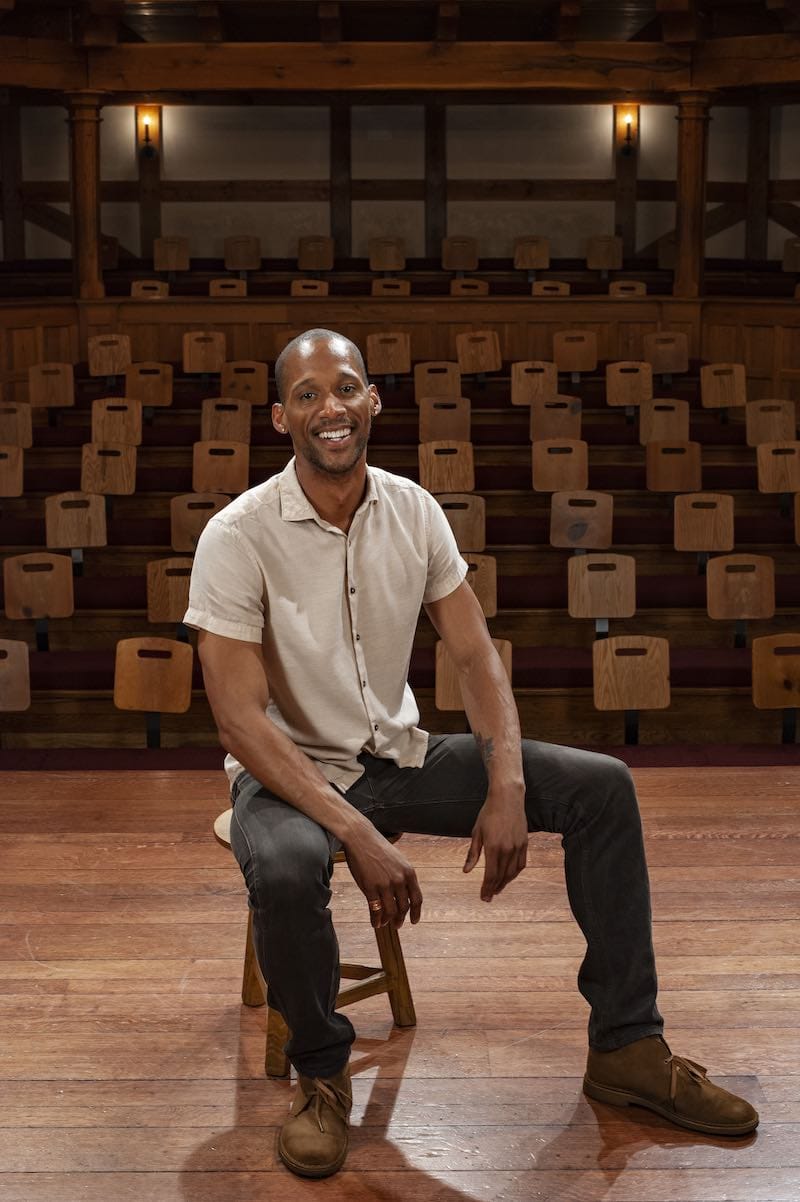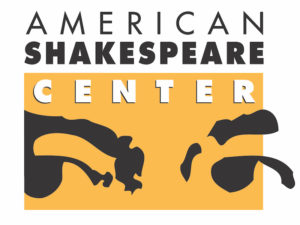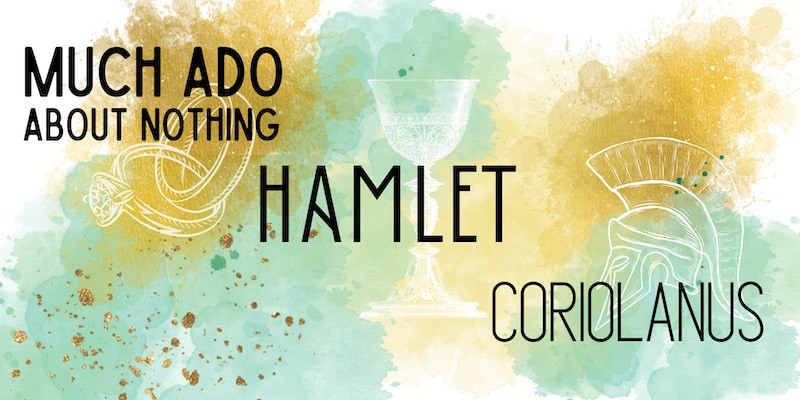At a time when many other regional theaters appear to be in crisis, one company in Virginia’s Shenandoah Valley carries on with a decades-old tradition, plying their trade with consistency, high quality, and a fervor that remains as infectious as ever.
The American Shakespeare Center in Staunton remains a cultural mecca for devotees of live theater, intimate theater, and above all, classic theater. Its commitment to performances of Shakespeare as the Bard originally intended — lights always up, with actors and audience collaborating to bring each play to vivid life — has never wavered. Even in recent years, when first the COVID pandemic and then a bitter dispute over the company’s former artistic director threatened to sink the ASC, the company has emerged with a pared-down look that more closely resembles Shakespeare’s original ensemble.

Leading the ASC through its time of troubles and guiding the transition to its next dynamic incarnation is its new artistic director, Brandon Carter. A native Virginian whose theatrical work has taken him across the country and overseas, Carter is matchless in his commitment to the company and its mission. More important, he is committed to creating a new, more cooperative model of leadership, as well as a new approach to cultivating local audiences, which responds directly to the issues that arose prior to Carter taking the helm. I recently had a chance to sit down with Carter in the lobby at ASC’s Blackfriars Playhouse, to learn more about his remarkable career and his vision for the future of the company.
What makes Carter’s leadership especially important are his deep Virginia roots, and the family tradition that produced him. He represents the fourth generation of Carters who have made their living in the Virginia maritime, and it is this background that has grounded Carter in a practical vision of the working ethos of the ASC. It also informs his goal of reaching out to nontraditional audiences — working people of color like his own family, who if given the chance would enjoy Shakespeare’s plays in the open, interactive format that has been the ASC’s hallmark.
Carter spent his formative years in the heart of Chesapeake Bay, two hours south of Fredericksburg in Heathsville, Virginia (in Northumberland County). There he practiced the fisher’s trade by his grandfather’s side, learning traditional sea chanties that guided his hands as the nets were pulled in with the day’s catch. The melodies and lyrics were grounded in the work at hand, and it is this practical experience with an ancient trade, and with the rhythm of working life, that sets Carter’s Shakespearian vision apart.
The maritime life had its joys — he and his grandfather would tour to share their songs with other seafarers — and by strange coincidence one of the few things young Carter had a knack for in school was Shakespeare; reading Julius Caesar was his gateway to a life on the stage.
Carter spent his undergraduate years at Longwood University in Farmville, Virginia, and in a sign of things to come he graduated with a BA in Theater and a minor in Strategic and Organizational Communications — both skill sets that have proven invaluable in the years since.
After Longwood, and a series of odd adventures in that special hell known as actors’ auditions (or as Polonius might say, “by indirections finding directions out”), Carter gained admission to the three-year MFA program at Penn State, where as part of his independent study of Shakespeare he worked with Cicely Berry, then the voice director for the Royal Shakespeare Company. Berry’s genius for the human voice, for breaking out of the stale, standard English approach to Shakespeare’s language, is legendary among the acting community.
Arriving at Penn State during a transitional period for their MFA program, Carter was able to take advantage of a wide variety of workshops with artists from New Vaudevillian Bill Irwin to New York’s Ty Jones, and DC’s own Craig Wallace, among many others. “It gave me a solid impression of what I could do in the field,” Carter says.

Among his greatest influences was British and American actor Jane Ridley, who taught Movement and Shakespeare, and Ed Stern, who trained Brandon in Shakespearian scene study. “Jane taught me the specificity in classical work, Ed taught me the professionalism needed to do what we do.” Carter even had the opportunity to apply the Meisner Technique to the classics. “This showed me that these classical characters can have a profound inner life and that the same moment-to-moment work must be applied to the classics.”
As part of his MFA, Carter also co-starred in fellow grad student Dominique Morisseau’s play Blood at the Root. An emerging playwright, Morisseau had already seen one of her plays produced at the Public Theater in New York. Blood at the Root dealt with racial tensions surrounding the trial of six Black high school students in Jena, Louisiana, for assaulting a white classmate. (The case of the Jena Six generated local and national protests and led to a congressional inquiry.)
After its premiere at Penn State, the show toured to Adelaide, Australia, as well as South Africa, before returning to the U.S. for a run at venues like the Kennedy Center in DC and the National Black Theatre in Harlem. The South African tour was especially meaningful because the cast hosted a theater workshop for members of the (indigenous) African community. Through a series of theater exercises, young people from across the country, many of them traditional adversaries, found ways to articulate their anxieties, working through them together by staging them for each other and providing feedback and suggestions on how familiar confrontations could be resolved. As Carter says, looking back:
“This play and the experience in Africa taught me about what my job as an artist was. It taught me that the kind of work that I wanted to do was rooted in craft, community, and activism. Through devised workshops, Blood at the Root gave those warring communities ownership in engaging and healing with each other.”
Carter also was the production manager of the show’s U.S. tour — giving him a deep dive into the challenges of actually running a company. Anxious to refocus on acting, he soon found a home in the Classical Theatre of Harlem, where he remains an artistic affiliate. CTH is a company dedicated to bringing traditional theater to underserved communities at low to no cost. Anchoring their work in the experience of the African American diaspora, its artists have proven how relevant and engaging classic theater can be — how the works of Shakespeare have a truly global, universal appeal.
Given his experience in Harlem, it is hardly surprising that one of Carter’s early moves as the artistic director of the American Shakespeare Center was to create a dialogue between one of Shakespeare’s most beloved and controversial plays, The Tempest, and its rebellious Caribbean cousin, Aimé Césaire’s Une Tempête. Rather than skate over concerns about the overtones of colonialism and racism in Shakespeare’s original, Carter wanted audiences to confront these concerns head-on. He also arranged for the ASC to host a number of talk-back sessions in which artists, scholars, and community leaders could talk about the plays, and about their resonance today.
The Tempest/Tempête repertory and its community-focused events marked a turning point, and a welcome one, in the ASC’s vision of itself. In the past, regular attendees at ASC shows might have noted the dearth of Black, Latino, and LGBTQ community members at performances. But as a recent visit confirms, ASC’s outreach has begun to attract audiences from these communities, to match their already growing presence on the Blackfriars stage. Given the increasing diversity of the Shenandoah Valley community, the changes are welcome indeed.
It is likely, however, that traditional social conservatism and the troubled racial history of this region were major obstacles to expanding local audiences. Staunton lies at the geographic heart of Virginia Governor (and Senator) Harry Byrd’s notorious “Massive Resistance” movement, which shut down public schools and denied education to an entire generation of Black children rather than integrate. The legacy of those years, and attitudes, was reflected in the remarks at one of the ASC’s talk-back sessions where a local activist admitted that Staunton, prior to Carter’s time, was not a place where she felt particularly welcome. This admission came as a gut-punch for some but spoke to the unfinished business that remains — unfinished business that the ASC is now uniquely poised to address.
Carter has found a way to use Shakespeare as a way to start the conversation, but also to reach out to a community that has traditionally felt the ASC had nothing to do with them.
“What I love is picturing the days when you dressed up and went out to see a show, you engaged with the audience at intermission and afterward about what you saw, then you go next door for some ice cream because you just saw that shop advertised in the show’s playbill. They go to this shop and they can be themselves; it’s a mix of all kinds of folks, rapping about what they saw at the Blackfriars. I come from a blue-collar family, and it’s about connection and supporting your neighbor. If we are invited, we come by the truckloads and you have to kick us out at the end of the night. We come where we are welcome. I want to demystify that fact that Shakespeare is limited to identity or class — it is for us all — these classics can not only bring our beloved Staunton together but Virginia at large.”
This vision of a thriving, local theater with a loyal local audience, with the audience’s diversity finally reflecting the diversity of talent onstage, is one worth cherishing and promoting.

COVID Safety: American Shakespeare Center strongly encourages patrons to mask when possible. ASC’s complete COVID-19 Safety Visitor’s Guide is here.
SEE ALSO: ‘Hamlet,’ ‘Coriolanus,’ and ‘Much Ado About Nothing’ to cap American Shakespeare Center’s 35th season (2023/24 season announcement, July 31, 2023)





